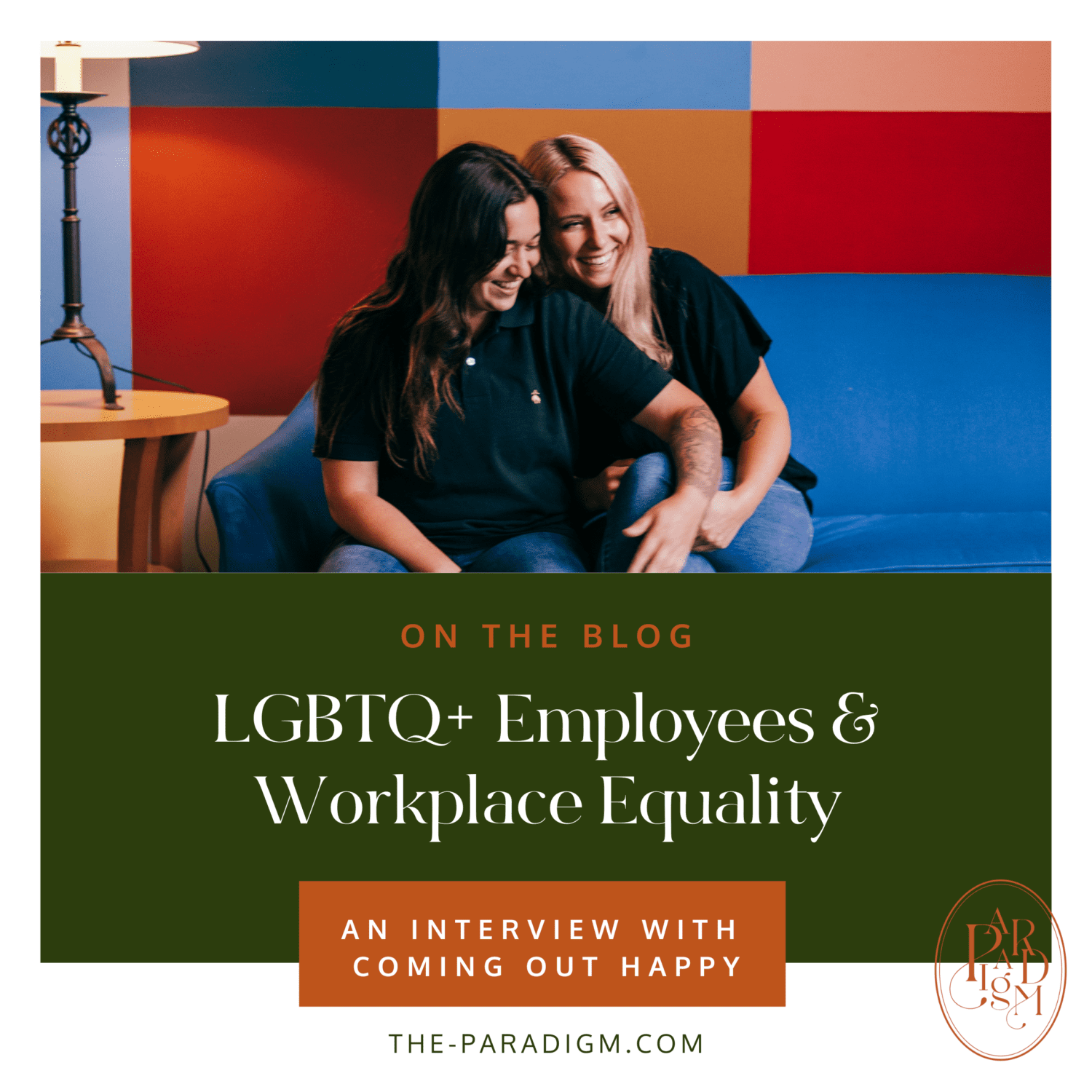June 1, 2022
Written by Kira La Forgia, CEO & Founder | Paradigm Consulting
“If employers actually took the time to care about queer people, there would be more successful queer people.”
With 20% of the LGBTQ community living under the poverty line (HRC), there has to be some accountability assigned to employers to create workplace equality. The only way we can help to create truly inclusive companies for LGBTQ+ employees is by changing the system upon which our companies are built. It sounds really hard right? Well, what if I told you that it’s one of the easiest thing you can do, and it can make a massive impact? You would do what you could right?
I spoke with clients turned friends Dani Max and Keely Antonio about their experiences with being queer in the workplace and how we can help empower cisgender/heterosexual entrepreneurs to take action to change the landscape at work for our LGBTQ+ team members.
Let’s just be clear, our goal here is not to tell you how to shortcut ally-ship in your business. Although all those things are great (and important!), this post is about the deeper understanding and commitment required to fostering a truly inclusive workplace for LGBTQ+ people to thrive.
Why Does A LGBTQ+ Friendly Workplace Matter? There is tons of research about how hiring and promoting a diverse population in your employee workforce (check here, here, and here) so we already know that hiring LGBTQ+ people can further the success of your business. However, this can only happy when LGBTQ+ employees feel comfortable and safe enough to be themselves and bring their honest and full perspectives to the job.
“There are a lot of situations that are uncomfortable because you are not sure of the other person’s response. The way around that is that it is the employer’s responsibility to create a culture that is accepting, that is showing people you care. I knew if I were going be accepted I would feel more comfortable being myself.”
Dani says that the longest she had ever stayed at a job prior to starting her own business was three months because she knew that if she stayed any longer that she would start to have to bring personal things into work, and she never felt safe doing that. And even if she felt safe, she felt that her success would be limited.
People like Dani, who identify as a lesbian and are on the more masculine side of expressing herself often felt like they had to tone down parts of themselves, like the way they dress, their speaking voice, and their self-expression, in order to stay safe, employed, and free of judgement. It’s hard enough to put your energy and effort behind a job, imagine putting a costume (of sorts) on every day to show up at your job. It’s no wonder queer people are more likely to be in hourly, entry level positions.
The Data
Research from the Human Rights Campaign says, “LGBTQ+ workers earn less than typical workers in the United States, with LGBTQ+ workers earning approximately 90 cents for every dollar earned by a typical worker, Black workers earning approximately 80 cents, trans men and nonbinary, genderqueer, genderfluid and two-spirit workers earning approximately 70 cents, and trans women earning approximately 60 cents.”
Additionally, the top 5 industries where you might find LGBTQ+ employees are also the most likely to not provide paid leave, medical insurance, and other benefits that help break cycles of poverty. LGBTQ+ people are twice as likely to be unemployed. (HRC)
Queer Employees In Leadership
There simply aren’t enough queer leaders, entrepreneurs, and CEO’s to reference. Not only for representation and visibility, but also so that non-LGBTQ+ people can see, work with, work for, celebrate, and look up to queer people in a professional setting.
“There is a lot of judgement and assumption in the professional world about what it looks like to be gay”, Keely says. “Employers think gay people are just running around naked at Pride because that is the only thing they have seen.”
Keely’s entire corporate career in an environment where she felt she had to keep her queer identity a secret in order to be accepted and deserving. Keely reflects on the time while she was climbing the corporate ladder. She knew that she would never be promoted and never be given opportunities for higher pay or promotions if anyone at her company knew she was gay.
In direct contrast with Dani, Keely is a feminine passing lesbian and was not only faced with sexism on a daily basis, but with comments from her primarily male counterparts asking about if she has a boyfriend, and if she would like to go to church with her coworkers (where she knew she wouldn’t be accepted). When she finally was offered a promotion and a promotion in a red state, she chose to leave her high paying career behind and become a babysitter.
Because at the end of the day, the LGBTQ+ community just wants to be accepted for who they are.
Money = Impact
We all know more money means opportunity, freedom, and it gets you a seat at the table. It is our responsibility as business owners to carry the burden of equality for the marginalized communities. My GOD. It’s the least we can do in coming from a position of privilege. Dani says, “What if that salary number started to go up because more people showed their acceptance and queer people could actually make more money.” Creating opportunities and safe places for queer people to not only work, but to thrive in their careers can make an exponential impact on society.
Take A Stance
As an entrepreneur, you get to make hiring decisions, and we don’t take those lightly. So how do we create workplaces where queer folks feel safe being their true authentic selves? Dani and Keely say it starts with you company policies and your external AND internal values. Here are a few things you can do today that take less than 5 minutes to start to show your team members that it is safe to be themselves at your company.
- Pronouns pronouns pronouns. Ask your staff to include pronouns in emails, Zoom names, and in discussions.
- Show your ally-ship through Pride flags and stickers, sharing resources for the LGBTQ+ community in your team newsletter or team meetings, and donate publicly to LGBTQ+ causes.
- Make your stance known. Don’t wait for a team member to come out to you to express support for the LGBTQ+ community.
Summary
When I asked Keely and Dani what are some of the things we could do to create a space of inclusion and safety for our LGBTQ+ employees, Keely said with enthusiasm and not a speck of sarcasm, “just any type of acceptance is fine!” Wow. What a low standard. We’ve got executives walking out of the office with million dollar bonuses, and the LGBTQ+ community just wants to feel safe and have the same opportunities they would have if they were straight.
“It’s just love,” Keely says. And we can end it there.
Make sure to check out all of the wonderful things that Dani and Keely are doing with their company Coming Out Happy and go make friends on social media!

